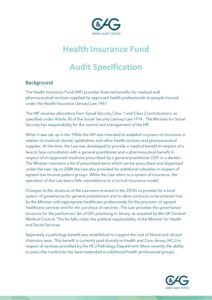
Wednesday 27 August 2025 - Audit Specification
Wednesday 27 August 2025 - Audit Specification
Topics: Financial Management and Internal Control
Departments: Employment, Social Security and Housing
Sector: Health & Social Care

Audit Specification: pdf (249.24 KB)
Download in full ↓The Health Insurance Fund (HIF) provides financial benefits for medical and pharmaceutical services supplied by approved health professionals to people insured under the Health Insurance (Jersey) Law 1967.
The HIF receives allocations from Social Security Class 1 and Class 2 contributions, as specified under Article 30 of the Social Security (Jersey) Law 1974. The Minister for Social Security has responsibility for the control and management of the HIF.
When it was set up in the 1960s the HIF was intended to establish a system of insurance in relation to medical, dental, ophthalmic and other health services and pharmaceutical supplies. At the time, the Law was developed to provide a medical benefit in respect of a face to face consultation with a general practitioner and a pharmaceutical benefit in respect of an approved medicine prescribed by a general practitioner (GP) or a dentist. The Minister maintains a list of prescribed items which can be prescribed and dispensed under the Law. Up to 2008 the Law also provided for additional subsidies in respect of agreed low income patient groups. While the Law refers to a system of insurance, the operation of the Law bears little resemblance to a normal insurance model.
Changes to the structure of the Law were enacted in the 2010s to provide for a local system of governance for general practitioners and to allow contracts to be entered into by the Minister with appropriate healthcare professionals for the provision of agreed healthcare services and for the purchase of vaccines. The Law provides the governance structure for the performers’ list of GPs practising in Jersey, as required by the UK General Medical Council. This list falls under the political responsibility of the Minister for Health and Social Services.
Separately a pathology benefit was established to support the cost of blood and clinical chemistry tests. This benefit is currently paid directly to Health and Care Jersey (HCJ) in respect of services provided by the HCJ Pathology Department. More recently the ability to prescribe medicines has been extended to additional health professional groups.
Contracts and services currently provided by the Minister for Social Security fall into a number of categories:
The UK Government Actuary’s Department (GAD) undertook reviews of two Jersey social security funds – the Social Security Fund (SSF) and the Health Insurance Fund (HIF) – as at 31 December 2021. Results were presented to States Members in June 2023 (States Assembly | R-97-2023).
The report noted that the HIF is projected to decline over the 20 year projection period, in current earnings terms, and be exhausted by around 2037-2041. The report noted that current contribution rates are lower than projected HIF expenditure year to year. The fund’s projected decline factors in expected increases in pharmaceutical costs and growing demand for healthcare associated with an ageing population.
The HCJ Annual Plan 2025 sets out an ambition for 2025 to amend the law to provide that the Minister for Health and Social Services is responsible for the Government’s annual health and care services budget (which mainly funds Government services) and the HIF (which mainly funds prescriptions and GP services).
Objectives of this Audit
The audit will consider the operation of the HIF in terms of:
Scope
The audit will extend to:
The audit will not evaluate the quality of health care services being funded by the HIF.
I am planning to undertake a separate audit of the Government’s programme of work looking at long-term sustainable healthcare funding.
Audit approach
This audit will use a:
The audit will commence with an initial documentation request. The findings of the document review will be followed by interviews with key officers and other stakeholders.
The audit will commence in September 2025. The detailed work will be undertaken by an affiliate engaged by the C&AG.

Associate Member of EURORAI - a cooperation project between public sector supervisory bodies in Europe